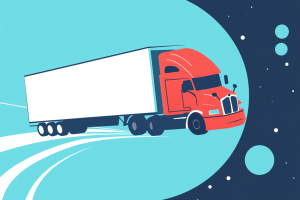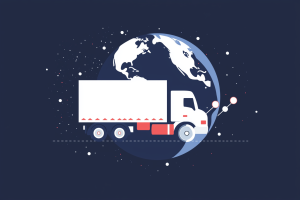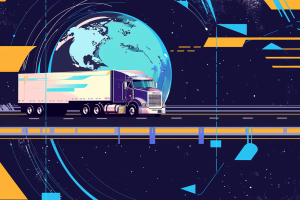- Navigating Uncertainty: Discover how pandemics, natural disasters, and trade disputes reshape the logistics landscape, challenging trucking to adapt swiftly and smartly.
- Technological Edge: Explore the critical role of technology in bolstering trucking logistics against the unpredictable impacts of global events.
- Strategic Resilience: Learn about innovative strategies that ensure the trucking industry remains resilient, even when global supply chains face disruption.
Understanding How Global Events Impact Trucking Logistics

Flexibility in operations is key to adapting to rapidly changing circumstances.
Global events impact trucking logistics in significant ways, often causing widespread disruptions in the supply chain. Whether it’s a pandemic, trade dispute, or natural disaster, these events can lead to challenges that affect freight transportation and logistics management. For industry stakeholders, understanding how global events impact trucking is crucial for developing strategies that enhance supply chain resilience and maintain operational efficiency.
For more insights on how transportation sectors worldwide are adapting to global challenges, explore our dedicated section here.
The Effects of Pandemics on Trucking and Logistics
The outbreak of pandemics, such as COVID-19, has had profound effects on trucking and logistics. The pandemic led to unprecedented global supply chain disruptions, affecting everything from manufacturing to last-mile delivery. Lockdowns and restrictions on movement caused significant delays in freight transportation, while health and safety concerns led to driver shortages.
To dive deeper into the impacts and responses within the trucking industry, check out this page.
Enjoying our insights?
Subscribe to our newsletter to keep up with the latest industry trends and developments.
Stay InformedImpact on Freight Transportation
Pandemics can drastically alter demand patterns, with certain goods experiencing surges in demand while others see declines. For instance, during COVID-19, there was increased demand for medical supplies and consumer staples, putting pressure on trucking companies to adjust routes and schedules rapidly. The sudden shift required agile logistics management to meet new demands.
Driver Shortages and Operational Challenges
Health risks associated with pandemics can lead to a reduced workforce as drivers fall ill or avoid work due to safety concerns. This exacerbates existing driver shortages, increasing operational costs and causing delays. Trucking companies must implement stringent health protocols and invest in protective equipment to safeguard their workforce, adding to the operational burden.

Effective crisis management includes establishing a response team, regularly updating plans, and conducting training.
How Trucking Companies Adapt
Trucking companies adapt by:
- Implementing strict health and safety measures.
- Offering incentives to retain and attract drivers.
- Utilizing technology for remote monitoring and management.
Case Study: COVID-19 Response
An example is how some trucking firms:
- Shifted focus to high-demand goods.
- Collaborated with government agencies for streamlined regulations.
- Adopted flexible scheduling to meet fluctuating demands.
How Natural Disasters Impact Trucking Routes and Infrastructure

Prioritizing critical shipments and leveraging partnerships are essential for maintaining operational efficiency.
Natural disasters, such as hurricanes, earthquakes, and floods, can severely damage transportation infrastructure, leading to blocked roads and bridges. This directly affects trucking routes, causing delays and necessitating rerouting, which increases transit times and costs.
For additional information on supply chain challenges and strategies, visit this link.
Infrastructure Damage and Supply Chain Disruptions
When key transportation arteries are damaged, the movement of goods slows down, impacting not just the trucking industry but the entire supply chain. For example, Hurricane Katrina in 2005 devastated infrastructure in the Gulf Coast, disrupting freight transportation for months. Such events highlight the vulnerability of supply chains to environmental factors.
Economic Impact on the Trucking Industry
The financial implications of natural disasters are significant. Increased fuel costs, vehicle wear and tear from detours, and the need for emergency logistics services all contribute to higher operational expenses. Insurance costs may also rise following major disasters, further straining the industry’s profitability.

Technological adoption drives improved tracking, decision making, and operational efficiency in logistics.
Mitigation Strategies
To mitigate these impacts, trucking companies:
- Invest in infrastructure monitoring systems.
- Develop alternative routing plans.
- Collaborate with authorities for rapid response efforts.
Technology’s Role in Overcoming Challenges
Technological tools like GPS and real-time data analytics help:
- Identify safe and efficient alternative routes.
- Monitor weather conditions and predict disruptions.
- Enhance communication with drivers and clients.
Understand the strategies being employed for effective crisis management in logistics, explore this link.
Trade Disputes and Their Effect on Global Supply Chains

Collaboration across the supply chain strengthens resilience and enables a coordinated response to crises.
Trade disputes between nations can lead to the imposition of tariffs and trade barriers, affecting the flow of goods across borders. For the trucking industry, this means adjusting to new regulations, increased paperwork, and potential delays at border crossings.
Adjusting to New Trade Regulations
Changes in trade policies require trucking companies to stay informed and adapt quickly. Compliance with new regulations may involve additional documentation, customs procedures, and adherence to different standards, which can slow down freight transportation.
Impact on Freight Volume and Demand
Trade disputes can reduce the volume of goods being traded internationally, leading to decreased demand for trucking services. Conversely, some industries may see increased domestic demand as companies seek local alternatives to imported goods, requiring the trucking industry to pivot accordingly.

In the face of global disruptions, the trucking industry’s ability to adapt and innovate is crucial for maintaining supply chain continuity.
Strategies for Compliance
Trucking companies can:
- Invest in training for regulatory compliance.
- Utilize customs brokerage services.
- Implement software solutions for document management.
Opportunities Amidst Challenges
Despite challenges, opportunities arise such as:
- Expanding into new markets.
- Offering specialized logistics services.
- Building stronger relationships with domestic suppliers.
Trucking Industry Response Strategies to Global Events
The trucking industry employs various strategies to respond to the challenges posed by global events. These include crisis management planning, technological adoption, and policy advocacy.

Strategic planning and crisis management become indispensable as global events challenge the resilience and efficiency of trucking logistics.
Discover how industries are planning strategic expansions to navigate future uncertainties, click here.
Crisis Management and Business Continuity Planning
Developing a comprehensive crisis management plan is vital. This includes establishing protocols for communication, resource allocation, and operational adjustments during emergencies.
Communication Protocols
Effective communication with drivers, customers, and stakeholders ensures that everyone is informed about changes and can respond accordingly. This reduces confusion and helps maintain trust during crises.
Resource Allocation and Flexibility
Having contingency plans for resource allocation allows trucking companies to reassign assets where they are needed most. Flexibility in operations is key to adapting to rapidly changing circumstances.

Preparing for future disruptions involves strategic planning, technological investment, and fostering industry partnerships.
Essential Components of Crisis Management
- Establishing a crisis response team.
- Regularly updating emergency plans.
- Conducting drills and training sessions.
Maintaining Operational Efficiency
Strategies include:
- Prioritizing critical shipments.
- Adjusting delivery schedules.
- Leveraging partnerships for resource sharing.
For more news on achieving operational efficiency under challenging conditions, check out this page.
Technological Innovations in Trucking Logistics
Adoption of new technologies can enhance efficiency and reduce vulnerability to global events
Autonomous Vehicles and Automation
While still in development, autonomous trucking has the potential to alleviate driver shortages and improve safety. Automation can also streamline logistics processes, reducing reliance on human labor that may be affected during pandemics.
Blockchain and Secure Transactions
Blockchain technology can enhance transparency and security in the supply chain. By providing an immutable record of transactions, it reduces the risk of fraud and errors, which is particularly valuable during chaotic global events.
Explore our coverage of freight security trends and developments, visit this link.

Blockchain enhances supply chain transparency and security, reducing fraud and errors.
Benefits of Technological Adoption
- Improved tracking and visibility.
- Enhanced data-driven decision making.
- Increased operational efficiency.
Challenges to Implementation
- High initial investment costs.
- Need for skilled personnel.
- Integration with existing systems.
Preparing for Future Global Supply Chain Disruptions
The trucking industry must proactively prepare for future global events to minimize their impact.
Investment in Workforce Development
Training and retaining skilled drivers and logistics professionals is crucial. This includes offering competitive benefits and focusing on safety and well-being.
Stay updated on the latest trends and insights in logistics management, follow this link.
Addressing Driver Shortages
Developing programs to attract new drivers, such as apprenticeship and training initiatives, can help alleviate workforce challenges.

Global events impact trucking by reshaping supply chain dynamics and necessitating swift, adaptive strategies within the industry.
Enhancing Driver Retention
- Offering competitive compensation.
- Providing career development opportunities.
- Ensuring a positive work environment.
Collaboration Across the Supply Chain
Working closely with suppliers, customers, and government agencies enhances the ability to respond effectively to global events.
Industry Partnerships
Forming alliances with other logistics providers and participating in industry groups can provide support and shared resources during crises.
Benefits of Collaboration
- Shared knowledge and best practices.
- Coordinated response efforts.
- Strengthened industry resilience.
Conclusion

New technologies in trucking logistics can significantly reduce vulnerability to global events.
Global events impact trucking logistics significantly, but with effective response strategies, the industry can navigate these challenges. By investing in technology, workforce development, and strategic planning, trucking companies can enhance supply chain resilience. Understanding the multifaceted ways in which global events impact trucking allows industry stakeholders to implement robust solutions that ensure the smooth operation of supply chains, even in the face of adversity.
Essential Strategies in Trucking Logistics Resilience
- Pandemic Response Protocols: Highlighting the adaptation of the trucking industry during global health crises, focusing on operational changes and safety measures that protect drivers and ensure continuity.
- Natural Disaster Readiness: Analysis of the infrastructure improvements and contingency planning that enable quick recovery and continuity in freight transportation after significant environmental disruptions.
- Trade Policy Adaptation: Discussing how the trucking industry navigates new trade regulations and tariffs, ensuring efficient cross-border freight movement despite geopolitical tensions.
- Technological Innovations: Overview of advancements like autonomous vehicles, blockchain, and AI analytics that transform logistics management, enhancing efficiency and transparency during global events.
- Regulatory Compliance Shifts: Insights into how trucking companies adapt to rapid changes in regulations and compliance requirements during international crises.
Further Reading on Global Impacts in Trucking
- Delve into the pressing concerns facing the trucking industry including driver shortages, regulatory challenges, and technological advancements at Critical Issues in the Trucking Industry – 2024.
- Understand how the trucking sector is addressing environmental challenges, such as black carbon emissions and climate change impacts at the MIT Climate Portal – Freight Transportation.
- Discover how the trucking industry plays a crucial role in maintaining efficient supply chains and the economic forces shaping its operations at NDSU Spotlight on Economics: Trucking Industry a Supply Chain Key Player.
- Investigate the workforce issues that dominate the trucking industry’s agenda, such as labor turnover and the need for more skilled drivers at ATRI – Trucking Workforce Issues Top the List of Industry Concerns.
- Examine how disruptions in the supply chain, from shipping to trucking, affect the transportation of goods and the overall economy at ATA Supply Chain Watch.



















